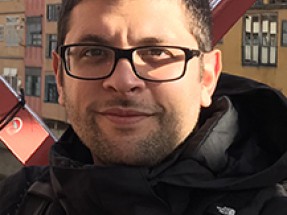People behind MiCRop: interview with Giannis Stringlis
2020-12-02

We talk a lot about science, but who are the people behind MiCRop and what do they do? In this series, we interview the researchers that are driving MiCRop. Read on to learn more about Giannis Stringlis, postdoctoral researcher at Utrecht University, and what he is working on!
Who are you, and how did you get involved in MiCRop?
I am a postdoctoral researcher at Plant-Microbe interactions Group in Utrecht University. After studying Agricultural Biotechnology and Molecular Phytopathology in Greece (BSc, MSc; Agricultural University of Athens), I moved to the Netherlands for my PhD (under the supervision of Prof. Corné Pieterse). During my PhD, I specialized in plant-microbe interactions and more specifically I studied how plants roots recognize and respond to beneficial microbes and their elicitors. In my first post-doc, I studied how plant root exudates can affect the microbes attracted around the roots. I found that coumarins can affect the root-associated microbiome and that some beneficial microbes are more tolerant to these compounds compared to some pathogenic ones.
My involvement in MiCRop is in line with my goal to understand the mechanisms employed by plants to recruit beneficial microbes under stress. Therefore, in my second post-doc in MiCRop, I want to expand the knowledge we gained with coumarins to other chemical and structural defense components of the plants. My aim is to understand their involvement in plant-microbiome communication and plant resilience during stress.
What are you currently working on?
My main research focus is on plant roots and the way they orchestrate their responses to root-associated microbes. I am also interested in the communication between roots and shoots and the chemical signals that mediate this communication. There is a number of ongoing projects that I (co-)supervise and I am actively involved in the experimental design, in performing the experiments and in data analysis.
What are typical tasks that you do in a week / what does a typical workday look like?
One thing I like in this specific career path I am following, is that the tasks of a day can be different from the tasks of the day before/after. When I work in front of the PC (now most of the time due to COVID-19), I have meetings with colleagues or collaborators, analyze data, write my own manuscripts or review manuscripts submitted for publication. Quite some time is also spent answering to emails and more recently to some teaching I am involved in. In the lab, I like to grow Arabidopsis seedlings in plates or in pots and test how the plants respond to microbes or a stress, either by analyzing growth parameters, gene expression or changes in the colonization of microbes and the exudation of plants.
What do you like most about the work you are doing?
In regards to the topic of my work, I like that I work with the “hidden half” of plants and with the interactions between roots and microbes colonizing them. Regarding the work itself, I like the interaction with people and the discussion of ideas! It is really satisfying to have a theory, and then design and perform experiments that prove this theory (or at least come close to this)! I also enjoy supervising students and see them grow both personally and scientifically.
Thank you for your answers, Giannis! You can follow Giannis also on Twitter and find him on LinkedIn and ResearchGate.
